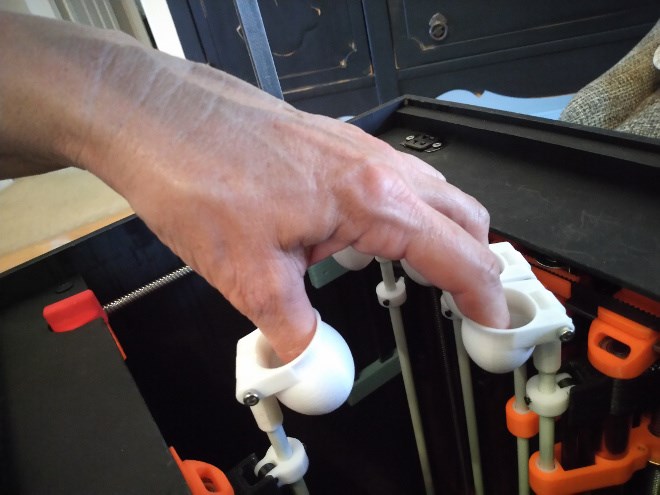Vineet Johnson never expected to become a neurophysiologist living in Sudbury.
But it looks like the CEO and cofounder of IRegained, a medical device company, might be in town for a while.
IRegained found a home at NORCAT – a local technology and innovation centre – this April, and received $250,000 in funding from the NORCAT Innovation Angels and the Northern Ontario Angels (NOA) to produce a low-cost device called MyHand that melds neuroscience and physiotherapy to help stroke patients recover hand function.
The Indian-born neuroscientist and physiotherapist had a long path to where he is, though.
When Johnson graduated from high school in 1991 he went into physiotherapy. He found neuroscience shortly after, during a lecture by prominent Indian neurophysiologist Marcus Devanandan. While everyone else fell asleep, Johnson was fascinated. After, Devanandan brought Johnson to his lab.
Devanandan was doing tests on monkeys while they were asleep. He applied an electrical current to a monkey’s brain to make its hand move.
"I asked him, 'Can you do it again?' and he said, 'This is not fun, it's science,' but he indulged me that one time,” said Johnson.
From there, Johnson turned his studies to both physiotherapy and neuroscience, gaining a reputation for his fascination with neuroplasticity, or the idea that you can recruit new pathways in the brain to do the work another part used to do.
“People knew me as the neuro-guy back then,” he said, laughing.
In 2000, Johnson moved to British Columbia for a master’s degree in neuroscience on stroke recovery, then a PhD on developing robotic devices for stroke patients.
In 2013, while working on his PhD, Johnson moved to Thunder Bay for a full-time research position in Lakehead University’s kinesiology department.
There, he met Daniel Vasiliu and opened up about his dream of having a portable, low-cost device for stroke patients to recover hand function.
Vasiliu, an engineer with two master’s degrees and more than 25 years of work experience, made that dream come true in his basement with supplies from a local dollar store.
The device had patients complete targeted, repetitive tasks aimed at stimulating new pathways in the brain. Current rehab devices clock in at over $100,000 and aren’t portable.
While the device was cheap, the research wasn’t. Fortunately, they attracted about 10 local partners – including the university, the Northwestern Ontario Regional Stroke Network, the local hospital, and several others – to fund them, and a patient trial.
The trial in 2016 saw eight people using the device for six weeks. Johnson remembers one woman who regained the ability to write.
“When you make an impact like that, it brings a tear to your eye,” said Johnson. “She went on to play accordion.”
Seeing the results, Johnson, Vasiliu and a third cofounder, Ranjit Stanley, started IRegained to manufacture the device they called MyHand.
In the spring of 2018, the project received a huge boost when Joel Liederman, a prominent and seasoned technology commercialization expert, joined the team to lead the business development.
Thanks to Liederman’s connections, they pitched the device at NORCAT that September.
Now, NORCAT provides office space for Johnson and business consulting advice for the project. IRegained’s seven other employees work remotely, or in clinical settings – either on patient trials or hand function classes.
One trial is at Sunnybrook Hospital in Toronto, funded by Innovation Canada; the other, funded by the Heart and Stroke Foundation, is at Toronto’s Baycrest Hospital and Hamilton’s McMaster University.
IRegained is paying for the Sudbury hand function classes, which both provide a service and serve as a marketing strategy to raise awareness about the MyHand.
At this point, IRegained has a prototype of MyHand, and the final version will be updated based on findings and feedback from the trials and classes. The goal is to have it to market by May, 2020, and Johnson estimates the final product will sell for around $3,000.
MyHand is a Class 1 device, which means they’ll require a Health Canada Medical Device Establishment License (MDEL), which Johnson said won’t take more than a couple months to acquire.
Ionic Engineering, just outside of Sudbury, will manufacture the device, with Squint in Thunder Bay on the industrial design.
They’ll create about 1,500 devices as part of the first phase, in which it will be sold to physiotherapists. Eventually, patients will be able to buy it themselves and use it at home.
The long-term goal is for MyHand to be used in telemedicine for stroke rehabilitation in remote communities, fulfilling Health Canada’s goal of making health care accessible to everyone.
For Johnson, after 20-plus years working in neuroscience and physiotherapy, he feels like this is his once-in-a-lifetime opportunity.
“How often do you get a chance to make a difference in peoples' lives? In the world?” said Johnson. “I don't think it will happen again.”




